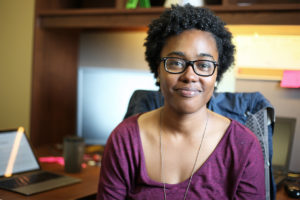This year Houghton College welcomed a new addition to the athletics department, thanks to the Ethnic Minorities and Women’s Internship Grant.
The funding, part of NCAA Division III’s diversity grants, brought Kiara Cooper to work on campus for the next two years and gain experience in the field of athletic administration. According to the NCAA website, the grant was established to help enhance diversity among Division III athletics.
 Cooper came to Houghton with a mission: to promote ethnic and gender diversity on a Division III college campus, which, like many of its kind, has historically welcomed mostly white, middle-class students. On the day-to-day level, Cooper will also serve as the assistant to the Athletic Director, Harold ‘Skip’ Lord, and as an assistant to the cross-country and track teams. She is not helping to coach these sports but to help in an administrative capacity, for which she feels she is more equipped and capable.
Cooper came to Houghton with a mission: to promote ethnic and gender diversity on a Division III college campus, which, like many of its kind, has historically welcomed mostly white, middle-class students. On the day-to-day level, Cooper will also serve as the assistant to the Athletic Director, Harold ‘Skip’ Lord, and as an assistant to the cross-country and track teams. She is not helping to coach these sports but to help in an administrative capacity, for which she feels she is more equipped and capable.
Holding a Bachelor’s Degree in art from Covenant College in Lookout Mountain, Georgia and a Master’s of Business from Belhaven University located in Jackson, Mississippi, Cooper was academically impressive and boasted a robust résumé of accomplishments. Cooper was also on the Dean’s List for all four years of her undergraduate studies and was an athletic marketing intern with an ultimate goal of becoming an athletic director at the collegiate level, an aspiration that impressed Lord.
She previously served as the site supervisor at Covenant College, a position she will now fill during Houghton events. Cooper also had a history of site supervision for sporting events and business administration at other institutions. A basketball player herself since the age of 8, she also coached basketball at the collegiate level at her alma mater. It was while holding the coaching position that she realized her calling was not for direct , but for sports administration. “Coaches have a certain passion,” she said, “but I just didn’t have that passion.”
Although she was excited to share her administrative gifts with the school, Cooper admitted that she initially felt some trepidation at the prospect of moving to Houghton. Growing up in Atlanta, she attended colleges that—while predominantly white—were located in diverse surroundings, and had never lived in an area with such sparse African-American and Latino populations. Cooper knew the subtle challenges of life as a black student at a white college ever since she was a student herself.
She remembered several nationwide events that brought racial tensions to the forefront, mentioning that these moments reminded her that she perceived the world differently from many others. “It’s not just minority ethnicity,” Cooper said. “It’s minority thought as well.” While she had never seen outright racism on her college campuses, she was also aware that much of the division is due to the absence of knowledge and experience that those who are not of color do not and cannot have.
Colleges that are predominantly white, she noted, tend to bring issues to the forefront that minority students have in the forefront of their lives. Cooper did not want to become the forefront of African-American issues, but she would love to add to the discussion and potentially bring certain tough discussions to the table. Cooper knew some people may be offended, but she noted Christianity is offensive to some people. They are offended by Christians’ audacious hope, something that her church talked about and has had her thinking. “I don’t know if I could be the bridge,” Cooper said, “but I would love to be at least a plank on that bridge.”
